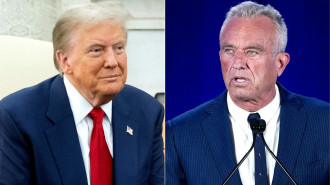Controversial Israeli TV show 'Fauda' back with focus on 'innocents' in conflict
"We see how people who do not want to go to war, who want to live in peace, get caught up in the Israeli-Palestinian conflict, in spite of themselves," he told AFP about the show, largely set in the Gaza Strip for the first time.
Fauda, which means "chaos" in Arabic, has won accolades and drawn controversy since it premiered in 2015 as the first prominent Israeli show to screen in both Hebrew and Arabic.
It has attracted a global following since it was picked up by Netflix in 2016, and the streaming service is set to release the third season in most of the world this week.
With unprecedented numbers of people streaming television at home during isolation forced by the Covid-19 pandemic, Fauda's third season appears poised to draw a substantial audience.
Issacharoff, an Israeli journalist who closely covered the conflict, said "the recipe remains the same overall, but this season is much more complex than the previous ones”.
Read also: Conan O'Brien and his fantastic marketing campaign for Israel
The earlier plot lines, based in the occupied West Bank, focused on the hunt for the head of the Islamist group Hamas and a commander from the Islamic State group.
Issacharoff - whose co-creator and Fauda lead actor Lior Raz served in the military unit on which the show is based - said the third season seeks to "show the heavy price paid by innocent people because of the conflict".
Twitter Post
|
The third seasons starts with Israeli agent Doron Kavillio, the central character played by Raz, going undercover in the West Bank city of Hebron.
Posing as a coach, Kavillio steers a young Palestinian boxer with a bright future down a path with substantial consequences.
The third season is the first with much of the action taking place in Gaza, the Palestinian enclave under an Israeli-enforced blockade since 2007, the year Hamas took power in the coastal strip.
Scenes set in Gaza were filmed in the Arab-Israeli cities of Kfar Kassem and Jisr al-Zarqa, in the centre and north of the Jewish state.
'An Israeli series'
Fauda has been praised by many as offering a nuanced depiction of the conflict, and the New York Times in December called it one of the 30 best international television shows of the decade.
It has in particular forced Israeli viewers to confront brutal aspects of the occupation while offering intimate, human portrayals of Palestinian combatants.
However, critics see it as one-sided as Israeli agents are undeniably depicted as the dare-devil protagonists.
Read also: Is Netflix taking part in Israel's propaganda 'Hasbara' campaign?
A 2018 review in the Guardian newspaper noted that the extent to which the show treats the conflict with evenhandedness is largely "in the eye of the beholder".
Issacharoff stressed that Fauda is an "Israeli series".
But, he said, "it is important for us not to caricature the enemy" and to show that they also "suffer, cry and love".
He added that he hopes the show can serve as a bridge between Israelis and Palestinians while highlighting the suffering on both sides.
Certain characters are based on personalities known to the co-creators, notably Yahya Sinwar, the Hamas leader in Gaza.
But, said Issacharoff, Fauda "remains fiction, even if we give it some elements of reality".
Reality is also often more complex than many imagine, he added, pointing to the fact that Israel and Hamas - who have fought three wars since 2008 - are cooperating to contain the COVID-19 outbreak in Gaza.
Agencies contributed to this report.
Follow us on Facebook, Twitter and Instagram to stay connected







 Follow the Middle East's top stories in English at The New Arab on Google News
Follow the Middle East's top stories in English at The New Arab on Google News
![The new film casts Israeli actors to tell the story of Mary while leaving out Palestinians [Getty]](/sites/default/files/styles/image_330x185/public/2024-11/GettyImages-2172155541.jpg?h=199d8c1f&itok=wJWyXDEQ)
![Ben & Jerry's has taken Unilever to court for its alleged attempts to silence it [Getty]](/sites/default/files/styles/image_330x185/public/2024-11/GettyImages-2183900214.jpg?h=199d8c1f&itok=jEcYtQ64)
